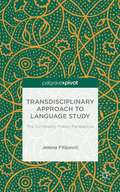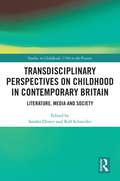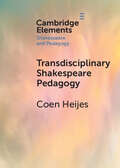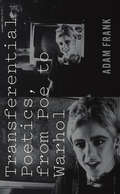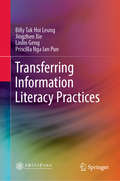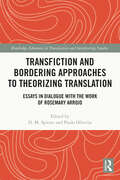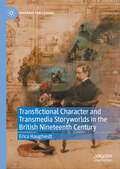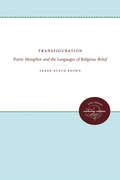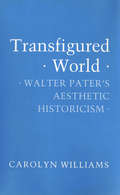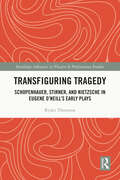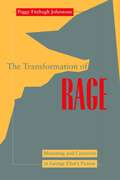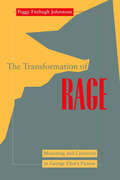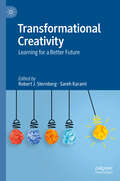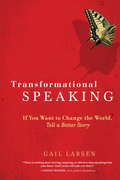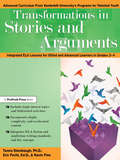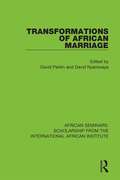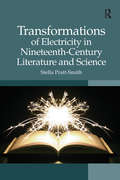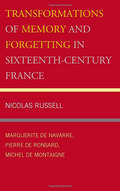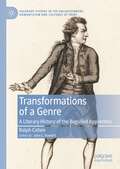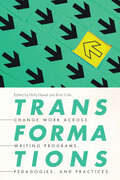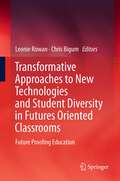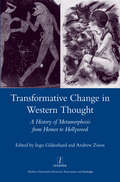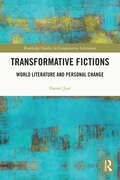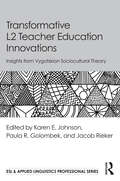- Table View
- List View
Transdisciplinary Approach to Language Study: The Complexity Theory Perspective
by Jelena FilipovićThis book is about complexity-driven, trandsisciplinary approach to language study. It illustrates how complexity science can be applied in the research of language and society in order to create and sustain a transdisciplinary dialogue across interested communities of practice which may be beneficial in improving living conditions of real people.
Transdisciplinary Perspectives on Childhood in Contemporary Britain: Literature, Media and Society (Studies in Childhood, 1700 to the Present)
by Ralf Schneider Sandra DinterIn the light of the complex demographic shifts associated with late modernity and the impetus of neo-liberal politics, childhood continues all the more to operate as a repository for the articulation of diverse social and cultural anxieties. Since the Thatcher years, juvenile delinquency, child poverty, and protection have been persistent issues in public discourse. Simultaneously, childhood has advanced as a popular subject in the arts, as the wealth of current films and novels in this field indicates. Focusing on the late twentieth and the early twenty-first centuries, this collection assembles contributions concerned with current political, social, and cultural dimensions of childhood in the United Kingdom. The individual chapters, written by internationally renowned experts from the social sciences and the humanities, address a broad spectrum of contemporary childhood issues, including debates on child protection, school dress codes, the media, the representation and construction of children in audiovisual media, and literary awards for children’s fiction. Appealing to a wide scholarly audience by joining perspectives from various disciplines, including art history, education, law, film and TV studies, sociology, and literary studies, this volume endorses a transdisciplinary and meta-theoretical approach to the study of childhood. It seeks to both illustrate and dismantle the various ways in which childhood has been implicitly and explicitly conceived in different disciplines in the wake of the constructivist paradigm shift in childhood studies.
Transdisciplinary Shakespeare Pedagogy (Elements in Shakespeare and Pedagogy)
by Coen HeijesBuilding on a general trend in academia towards convergence in teaching and research, in which interdisciplinarity and relevance are cornerstones, Transdisciplinary Shakespeare Pedagogy offers a sense both of the opportunities and challenges in teaching Shakespeare beyond the confines of the English literature department by setting up structural partnerships across disciplinary units and provides possible ways forward on the road to wider cooperation, collaboration and integration between curriculums, teachers and students of different disciplines. With Shakespeare studies increasingly under fire, the author analyses, through four recent case studies of university courses for a variety of students, the potential for integration of Shakespeare studies, social sciences and societal challenges.
Transferential Poetics, from Poe to Warhol
by Adam FrankTransferential Poetics presents a method for bringing theories of affect to the study of poetics. Informed by the thinking of Silvan Tomkins, Melanie Klein, and Wilfred Bion, it offers new interpretations of the poetics of four major American artists: Edgar Allan Poe, Henry James, Gertrude Stein, and Andy Warhol. The author emphasizes the close, reflexive attention each of these artists pays to the transfer of feeling between text and reader, or composition and audience— their transferential poetics. The book’s historical route from Poe to Warhol culminates in television, a technology and cultural form that makes affect distinctly available to perception. The peculiar theatricality of these four artists, Frank argues, can best be understood as a reciprocal framing relation between the bodily means of communicating affect (by face and voice) and technologies of graphic reproduction.
Transferring Information Literacy Practices
by Billy Tak Leung Jingzhen Xie Linlin Geng Priscilla Nga PunThis book focuses on information literacy for the younger generation of learners and library readers. It is divided into four sections: 1. Information Literacy for Life; 2. Searching Strategies, Disciplines and Special Topics; 3. Information Literacy Tools for Evaluating and Utilizing Resources; 4. Assessment of Learning Outcomes. Written by librarians with wide experience in research and services, and a strong academic background in disciplines such as the humanities, social sciences, information technology, and library science, this valuable reference resource combines both theory and practice. In today's ever-changing era of information, it offers students of library and information studies insights into information literacy as well as learning tips they can use for life.
Transfiction and Bordering Approaches to Theorizing Translation: Essays in Dialogue with the Work of Rosemary Arrojo (Routledge Advances in Translation and Interpreting Studies)
by Paulo Oliveira D. M. SpitzerThis collection seeks to expand the centers from which scholars theorize translation, building on themes in Rosemary Arrojo’s pioneering work on transfiction and the influence of bordering disciplines in investigating and elucidating questions central to the field of translation studies. Chapters by scholars around the world theorize translation from diverse perspectives, drawing on a wide range of literatures, genres, and media, including fiction, philosophy, drama, and film. Half the chapters explore the influence of Rosemary Arrojo’s work on transfiction and the ways in which fictional representations of translators and translation can shed new light on theoretical concerns. The other chapters look to fields outside translation studies, such as linguistics, media studies, and philosophy, to demonstrate the ways in which the key thinkers and theories that have influenced Arrojo’s work can be seen in other disciplines and in turn, encourage further cross-disciplinary research interrogating key questions in the field. The collection makes the case for a multi-layered approach to theorizing translation, one which accounts for the rich possibilities in revisiting existing work and thinking outside disciplinary boundaries in order to advance the field. This book will be of interest to students and scholars in translation studies and comparative literature.
Transfictional Character and Transmedia Storyworlds in the British Nineteenth Century (Palgrave Fan Studies)
by Erica HaugtvedtThis book is a study of how transfictional and transmedia storytelling emerges in the nineteenth century and how the period’s receptive practices anticipate the receptive practices of fandom and transmedia storytelling franchises in the twentieth and twenty-first centuries. The central claim is that the serialized, periodical, and dramatic media environment of the late eighteenth century through the nineteenth century in Great Britain trained audiences to perceive the continuous identity of characters and worlds across disparate texts, illustrations, plays, and songs by creators other than the earliest originating author. The book contributes to fan studies, transmedia studies, and nineteenth-century periodical studies while also interrogating the nature of fictional character.
Transfiguration: Poetic Metaphor and the Languages of Religious Belief (Studies in Religion)
by Frank Burch BrownBrown proposes a theory of poetic metaphor that attempts to account for literature's complex role in the discovery and creation of significant patterns within both language and life. He shows that while poetic and conceptual modes of discover are different, they are nevertheless mutually interdependent. In particular, Brown offers a new view of the way in which theological and metaphysical concepts grow out of, and are transfigured by, metaphoric expression. This view is expressed in a detailed and original analysis of the structure and dynamics of T.S. Eliot's Four Quartets that lies at the heart of the study.Originally published in 1983.A UNC Press Enduring Edition -- UNC Press Enduring Editions use the latest in digital technology to make available again books from our distinguished backlist that were previously out of print. These editions are published unaltered from the original, and are presented in affordable paperback formats, bringing readers both historical and cultural value.
Transfigured World: Walter Pater's Aesthetic Historicism
by Carolyn WilliamsExploring the intricacy and complexity of Walter Pater’s prose, Transfigured World challenges traditional approaches to Pater and shows precise ways in which the form of his prose expresses its content. Carolyn Williams asserts that Pater’s aestheticism and his historicism should be understood as dialectically interrelated critical strategies, inextricable from each other in practice. Williams discusses the explicit and embedded narratives that play a crucial role in Pater’s aesthetic criticism and examines the figures that compose these narratives, including rhetorical tropes, structures of argument such as genealogy, and historical or fictional personae.
Transfiguring Tragedy: Schopenhauer, Stirner, and Nietzsche in Eugene O’Neill’s Early Plays (ISSN)
by Ryder ThorntonThis book demonstrates Eugene O’Neill’s use of philosophy in the early period of his work and provides analyses of selected works from that era, concluding with The Hairy Ape, completed in 1921, as an illustration of the mastery he had achieved in dramatizing key concepts of philosophy.Analyses of one-act and full-length plays from 1913 to 1921 reveal the influence of the three philosophers and establish that O’Neill was fundamentally a philosophic playwright, even from his earliest dramatic sketches. Specific concepts from Schopenhauer, Stirner, and Nietzsche went into O’Neill’s shaping of character arcs, dramatic circumstances, symbology, and theme. Among them are Schopenhauer’s concept of will and representation, Stirner’s notion of possession, and Nietzsche’s principle of the Apollonian–Dionysian duality. These ideas were foundational to O’Neill’s construction of tragic irony apparent in his early period plays. The critical concepts of these three philosophers are the major pathways in this study. However, such an approach inevitably reveals other layers of spiritual influence, such as Catholicism and Eastern philosophy, which are touched on in these analyses.This book is a much-needed introduction to philosophic concepts in Eugene O’Neill’s early work and would be of great interest to students and scholars in theatre studies and philosophy.
Transfiguring the Arts and Sciences
by Jon KlancherIn this important and innovative study Jon Klancher shows how the Romantic age produced a new discourse of the 'Arts and Sciences' by reconfiguring the Enlightenment's idea of knowledge and by creating new kinds of cultural institutions with unprecedented public impact. He investigates the work of poets, lecturers, moral philosophers, scientists and literary critics – including Coleridge, Godwin, Bentham, Davy, Wordsworth, Robinson, Shelley and Hunt – and traces their response to book collectors and bibliographers, art-and-science administrators, painters, engravers, natural philosophers, radical journalists, editors and reviewers. Taking a historical and cross-disciplinary approach, he opens up Romantic literary and critical writing to transformations in the history of science, history of the book, art history, and the little-known history of arts-and-sciences administration that linked early-modern projects to nineteenth- and twentieth-century modes of organizing 'knowledges'. His conclusions transform the ways we think about knowledge, both in the Romantic period and in our own.
Transformation of Rage: Mourning and Creativity in George Eliot's Fiction
by Peggy Fitzhugh JohnstoneGeorge Eliot has been widely praised both for the richness of her prose and the universality of her themes. In this compelling study, Peggy Fitzhugh Johnstone goes beyond these traditional foci to examine the role of aggression in Eliot's fiction and to find its source in the author's unconscious sense of loss stemming from traumatic family separations and deaths during her childhood and adolescence. Johnstone demonstrates that Eliot's creative work was a constructive response to her sense of loss and that the repeating patterns in her novels reflect the process of release from her state of mourning for lost loved ones.
Transformation of Rage: Mourning and Creativity in George Eliot's Fiction (Open Access Lib And Hc Ser. #9)
by Peggy Fitzhugh JohnstoneGeorge Eliot has been widely praised both for the richness of her prose and the universality of her themes. In this compelling study, Peggy Fitzhugh Johnstone goes beyond these traditional foci to examine the role of aggression in Eliot's fiction and to find its source in the author's unconscious sense of loss stemming from traumatic family separations and deaths during her childhood and adolescence. Johnstone demonstrates that Eliot's creative work was a constructive response to her sense of loss and that the repeating patterns in her novels reflect the process of release from her state of mourning for lost loved ones.
Transformational Creativity: Learning for a Better Future
by Robert J. Sternberg Sareh KaramiThis edited volume brings together leading scholars in diverse disciplines to share their best thinking on how creativity can be conceived of, taught for, and deployed to serve rather than undermine humanity. Transformational creativity, as defined in this book, is creativity deployed to make a positive, meaningful, and potentially enduring difference to the world. Transformational creativity is compared to transactional creativity, which is creativity deployed in search of a reward, whether externally or internally generated.
Transformational Speaking: If You Want to Change the World, Tell a Better Story
by Gail LarsenYou can change the world--one audience at a time! Today's challenging times call for passionate visionaries who are authentic and articulate communicators. Speaking coach and consultant Gail Larsen presents a proven program that liberates the "speaker within" and transforms even the reluctant orator into an agent of change. While most books on public speaking focus on polishing your presentation and overcoming fear, Larsen's holistic blend of spirit and logic goes far beyond the standard format, making TRANSFORMATIONAL SPEAKING a must-read for even the most seasoned speechmakers. With her uniquely inspirational approach, Larsen reaches out to those who want to make a genuine difference in our world by changing minds through touching hearts. TRANSFORMATIONAL SPEAKING offers insightful advice on everything from defining your message and refining your delivery, to managing the dynamics of a room, handling logistics like a pro, and building a connection with an audience of any size. Larsen has helped business executives and entrepreneurs, community and social change leaders, and healers and life coaches become active movers and shakers through the power of effective communication.
Transformations in Stories and Arguments: Integrated ELA Lessons for Gifted and Advanced Learners in Grades 2-4
by Tamra Stambaugh Eric Fecht Kevin FinnTransformations in Stories and Arguments explores essential questions, such as "How does the development of a character build the reader's understanding? How do the actions of others change the world? How do words and images impact our thinking?" This unit, developed by Vanderbilt University's Programs for Talented Youth, is aligned to the Common Core State Standards and features accelerated content, creative products, differentiated tasks, engaging activities, and the use of in-depth analysis models to develop sophisticated skills in the language arts. Through the lens of transformation, students will examine narrative and persuasive elements essential to the analysis of short stories, advertisements, visual art, scientific argumentation, and their own writing. Students will discover transformations in themselves and their written work as they craft and revise narrative and persuasive pieces, realizing their own voice in the process. Ideal for gifted classrooms or gifted pull-out groups, the unit features stories by Dan Santat, Fiona Roberton, Jannell Cannon, Christopher Myers, Maurice Sendak, Daniel Manus Pinkwater, Jane Yolen, and Patricia Polacco; poetry by Carl Sandburg; sculptures by Arturo Di Modica and Kristen Visbal; a viewing of Pixar's short film Lou and a variety of commercials; and engaging short nonfiction readings.Winner of the 2015 NAGC Curriculum Studies AwardGrades 2-4
Transformations of African Marriage (African Seminars: Scholarship from the International African Institute #6)
by David Parkin David NyamwayaOriginally published in 1987, this book shows that there is still considerable continuity in the practices and ideas of marriage in Afican against a background of social and economic change. This book discusses the diverse marriage forms in Africa and explores the different systems some of which can be understood in terms of Levi-Strauss's distinciton between complex and semi-complex structures, while others throw up questions of filiation, child custoidanship and rights secured through bridewealth transactions.
Transformations of Electricity in Nineteenth-Century Literature and Science
by Stella Pratt-SmithThroughout the nineteenth century, practitioners of science, writers of fiction and journalists wrote about electricity in ways that defied epistemological and disciplinary boundaries. Revealing electricity as a site for intense and imaginative Victorian speculation, Stella Pratt-Smith traces the synthesis of nineteenth-century electricity made possible by the powerful combination of science, literature and the popular imagination. With electricity resisting clear description, even by those such as Michael Faraday and James Clerk Maxwell who knew it best, Pratt-Smith argues that electricity was both metaphorically suggestive and open to imaginative speculation. Her book engages with Victorian scientific texts, popular and specialist periodicals and the work of leading midcentury novelists, including Charles Dickens, Charlotte Bronte, Emily Bronte, William Makepeace Thackeray and Wilkie Collins. Examining the work of William Harrison Ainsworth and Edward Bulwer-Lytton, Pratt-Smith explores how Victorian novelists attributed magical qualities to electricity, imbuing it with both the romance of the past and the thrill of the future. She concludes with a case study of Benjamin Lumley’s Another World, which presents an enticing fantasy of electricity’s potential based on contemporary developments. Ultimately, her book contends that writing and reading about electricity appropriated and expanded its imaginative scope, transformed its factual origins and applications and contravened the bounds of literary genres and disciplinary constraints.
Transformations of Memory and Forgetting in Sixteenth-Century France: Marguerite de Navarre, Pierre de Ronsard, Michel de Montaigne
by Nicolas RussellThis book proposes that in a number of French Renaissance texts, produced in varying contexts and genres, we observe a shift in thinking about memory and forgetting. Focusing on a corpus of texts by Marguerite de Navarre, Pierre de Ronsard, and Michel de Montaigne, it explores several parallel transformations of and challenges to traditional discourses on the human faculty of memory. Throughout Classical Antiquity and the Middle Ages, a number of influential authors described memory as a powerful tool used to engage important human concerns such as spirituality, knowledge, politics, and ethics. This tradition had great esteem for memory and made great efforts to cultivate it in their pedagogical programs. In the early sixteenth century, this attitude toward memory started to be widely questioned. The invention of the printing press and the early stages of the scientific revolution changed the intellectual landscape in ways that would make memory less important in intellectual endeavors. Sixteenth-century writers began to question the reliability and stability of memory. They became wary of this mental faculty, which they portrayed as stubbornly independent, mysterious, unruly, and uncontrollable–an attitude that became the norm in modern Western thought as is illustrated by the works of Descartes, Locke, Freud, Proust, Foucault, and Nora, for example. Writing in this new intellectual landscape, Marguerite de Navarre, Ronsard, and Montaigne describe memory not as a powerful tool of the intellect but rather as an uncontrollable mental faculty that mirrored the uncertainty of human life. Their characterization of memory emerges from an engagement with a number of traditional ideas about memory. Notwithstanding the great many differences in concerns of these writers and in the nature of their texts, they react against or transform their classical and medieval models in similar ways. They focus on memory’s unruly side, the ways that memory functions independently of the will. They associate memory with the fluctuations of the body (the organic soul) rather than the stability of the mind (the intellectual soul). In their descriptions of memory, these authors both reflect and contribute to a modern understanding of and attitude towards this mental faculty. Published by University of Delaware Press. Distributed worldwide by Rutgers University Press.
Transformations of a Genre: A Literary History of the Beguiled Apprentice (Palgrave Studies in the Enlightenment, Romanticism and Cultures of Print)
by Ralph CohenThe aim of this book is to orchestrate “a generic reconstitution of literary studies” based on a comprehensive theory of genre and generic transformation. Taking “An Excellent Ballad of George Barnwel,” a seventeenth-century broadside of sex and greed, Ralph Cohen analyzes the generic transformations—including Addison’s ballad criticism in The Spectator, The London Merchant, Percy’s ballad editing in Reliques, and Barnwell. A Novel—in which this particular ballad exhibits remarkable continuity over the next four centuries, culminating with his personal re-formation; what was considered non-literary criticism becomes literary. This unique literary history reconceives narrative as a component of genre rather than a genre itself, demonstrates the ineluctably mixed nature of genres and the literary nature of our humanness, and analyzes the shifting generic contexts for interpretation and gender relations. Incorporating theory consciousness into the literary genre he is regenerating, Cohen offers a brilliant example of how future literary histories might be written.
Transformations: Change Work across Writing Programs, Pedagogies, and Practices
by Holly Hassel Kirsti ColeAs teaching practices adapt to changing technologies, budgetary constraints, new student populations, and changing employment practices, writing programs remain full of people dedicated to helping students improve their writing. This edited volume offers strategies for implementing large- and small-scale changes in writing programs by focusing on transformations—the institutional, programmatic, curricular, and labor practices that work together to shape our teaching and learning experiences of writing and rhetoric in higher education. The collection includes chapters from multiple award-winning writing programs, including the recipients of the Two-Year College Association’s Outstanding Programs in English Award and the Conference on College Composition and Communication’s Writing Program Certificate of Excellence. These authors offer perspectives that demonstrate the deep work of transformation in writing programs and practices writ large, confirm the ways in which writing programs are connected to and situated within larger institutional and disciplinary contexts, and outline successful methods for navigating these contexts in order to transform the work. In using the prism of transformation as the organizing principle for the collection, Transformations offers a range of strategies for adapting writing programs so that they meet the needs of students and teachers in service of creating equitable, ethical literacy instruction in a range of postsecondary contexts. Contributors: Leah Anderst, Cynthia Baer, Ruth Benander, Mwangi Alex Chege, Jaclyn Fiscus-Cannaday, Joanne Giordano, Rachel Hall Buck, Sarah Henderson Lee, Allison Hutchinson, Lynee Lewis Gaillet, Jennifer Maloy, Neil Meyer, Susan Miller-Cochran, Ruth Osorio, Lori Ostergaard, Shyam Pandey, Cassie Phillips, Brenda Refaei, Heather Robinson, Shelley Rodrigo, Julia Romberger, Tiffany Rousculp, Megan Schoen, Paulette Stevenson
Transformative Approaches to New Technologies and Student Diversity in Futures Oriented Classrooms
by Leonie Rowan Chris BigumIn this book we outline an optimistic, aspirational and unashamedly ambitious agenda for schooling. We make cautious use of the concept of 'future proofing' to signal the commitment of the various authors to re-thinking the purposes, content and processes of schooling with a view to ensuring that all children, from all backgrounds are prepared by their education to make a positive contribution to the futures that are ahead of them. The book focuses on issues relating to technology and social justice to re-examine the traditional relationship between schools and technology, between schools and diverse learners, and between schools, children and knowledge. Drawing from examples from around the world, the book explores practical ways that diverse schools have worked to celebrate diverse understandings of what it means to be a learner, a citizen, a worker in these changed and changing times and the ways different technologies can support this agenda.
Transformative Change in Western Thought: A History of Metamorphosis from Homer to Hollywood
by Ingo GildenhardThis groundbreaking volume maps the shifting place and function of marvelous transformations from antiquity to the present day. Shape-shifting, taking animal bodies, miracles, transubstantiation, alchemy, and mutation recur and echo throughout ancient and modern writing and thinking and continue in science fiction today as tales of gene-splicing and hybridisation. The idea of metamorphosis lies in uneasy coexistence with orderly world views and it is often cast out, or attributed to enemies. Augustine and the church fathers consider shape-shifting ungodly; Enlightenment thinkers suppress alchemy as unscientific; genetically-modified wheat and stem-cell research are stigmatised as unnatural. Yet the very possibility of radical transformation inspires hope just as it frightens. A provocative, theorising, trans-historical history, this book ranges across classics, literature, history, philosophy, theology and anthropology. From Homer and Ovid to Proust and H. P. Lovecraft and through figures from Proteus to Kafka's Fly and toSpiderman, four historical surveys are combined with nine case studies to show the malleable, yet persistent, presence of transformation throughout Western cultural history.
Transformative Fictions: World Literature and Personal Change (Routledge Studies in Comparative Literature)
by Daniel JustTransformative Fictions: World Literature and Personal Change engages with current debates in world literature over the past twenty years, addressing the nature of literary influence in centers and peripheries, the formation of transnational literary and pedagogical canons, and the role of translation and regionalism in how we relate to texts from around the globe. The author, Daniel Just, argues for a supranational but sub-global perspective of regions that emphasizes practical reasons for reading and focuses on the potential of literary texts to stimulate personal transformation in readers. One of the recurring dilemmas in these debates is the issue of delimitation of world literature. The trouble with the world as a frame of reference is that no single researcher is bound to have the in-depth knowledge and linguistic skills to discuss works from all countries. In response, this book revives literary theory and recasts it for the purposes of world literature, by making a case for the continuing relevance of literature in the age of new media. With the examples of fictional and nonfictional writings by Milan Kundera, Witold Gombrowicz and Bohumil Hrabal, Just shows that regional literatures offer differing methods of activating readers and thereby prompting personal change. This book would be of general interest to anyone who wants to explore personal change through literature but is particularly indispensable for literary professionals, researchers, and postgraduate and graduate students.
Transformative L2 Teacher Education Innovations: Insights from Vygotskian Sociocultural Theory (ESL & Applied Linguistics Professional Series)
by Karen E. Johnson Paula R. Golombek Jacob RiekerTransformative L2 Teacher Education Innovations features empirical research studies informed by Vygotskian Sociocultural Theory (VSCT) that are explicitly and intentionally designed to transform second language (L2) teacher reasoning and thinking, as well as L2 teaching practices and pedagogical choices.With contributions from scholars and practicing teacher educators, each chapter highlights a designed innovative professional development experience that has created a “new” social situation of development with a clearly articulated “ideal” for L2 teachers to embrace and/or achieve. Each study articulates the rationale and unique design features of the innovation, the intentionality behind the choices made when designing and enacting the innovation, and the quality, character, and outcomes of the intervention for L2 teachers. Furthermore, each study documents the forms of mediation that are offered to support L2 teacher professional development, such as conceptual tools, goal-directed activities, and/or social relations/interactions.The book offers insight into the internal logic of VSCT-informed L2 Teacher Education and provides concrete examples of how L2 teacher educators can adopt a Vygotskian-informed pedagogical stance in their teacher education practices. The edited collection is especially applicable for scholars and teacher educators in language education, applied linguistics, TESOL, and bilingual education who engage with Vygotskian Sociocultural Theory.
